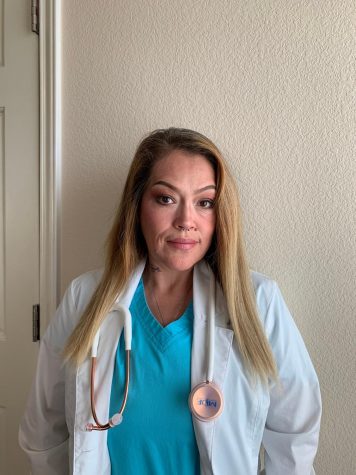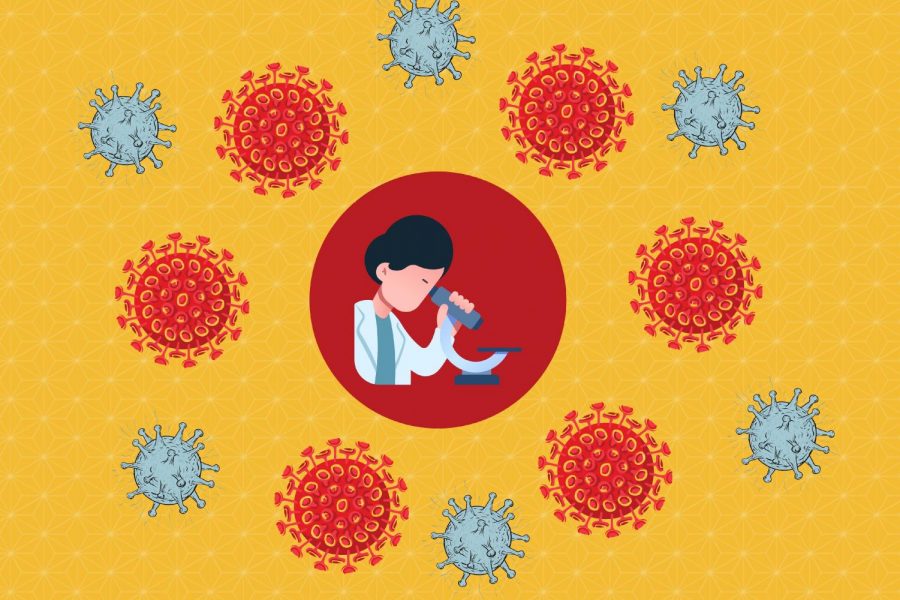Your donation will support the student journalists of Akins High School. Your contribution will allow us to purchase equipment and cover our annual website hosting costs.
New strains of COVID-19 prove to be easier to spread
March 10, 2021
The new coronavirus variant from the United Kingdom was detected in Austin, local health authorities announced on Feb. 3.
Austin Public Health officials said they are concerned but not surprised at the finding. Citing reports from the federal Centers for Disease Control and Prevention, interim Austin-Travis County Health Authority Dr. Mark Escott said variants of the coronavirus may be more contagious, but they are not more deadly than the older strain of the coronavirus.
Stephanie Hayden-Howard, director of Austin Public Health said in a written press statement that it is important to remember that these COVID-19 variants spread the same way, and so it is important to continue the prevention measures we have been using for almost a year.
“People need to keep wearing a mask, social distancing, avoiding gatherings and washing [their] hands frequently.”
Where is the new Covid variant spreading?
A new strain of covid-19 has been spreading rapidly in the United Kingdom has now been found in the United States in at least two locations, being called the “more contagious version”.
The variant has now been detected in Canada, Spain, Sweden, France, and Italy, among others. Variants with the same mutation have been reported in Brazil and South Africa, and now scientists are studying whether a variant with a different mutation first found in Denmark, along with one identified in California, have caused a surge of cases in California.
British Prime Minister Boris Johnson announced Friday that the British variant was believed to be more infectious. For 1,000 people aged 60, approximately 10 people would be expected to die, he said. With the new variant, called B.1.1.7, roughly 13 or 14 are dying, he said, citing data from the New and Emerging Respiratory Virus Threats Advisory Group, which advises the United Kingdom Government.
What does this mean for Covid case numbers?
Even if the variant isn’t deadlier, more infectious variants will kill more people, Dr. Anthony Fauci, the nation’s top disease expert, said in an interview with __ publication.Thursday.
“If you have a virus that’s more transmissible, you’re going to get more cases,” he said.
“When you get more cases, you’re going to get more hospitalizations, and when you get more hospitalizations, you ultimately are going to get more deaths.”
So far, none of the new variants appears to make people sicker or cause more death. It has the potential to infect an estimated 50 percent more people. The Centers for Disease Control and Prevention has predicted that this variant could become the dominant source of infection in the United States by March.
How can we protect ourselves from the mutations?
Wear a two- or three-layer mask. Don’t spend time indoors with people not from your household. Avoid crowds, and keep your distance. Wash your hands often and avoid touching your face.
What are we doing to stop the spread?
President Joe Biden recently on Monday reinstated COVID-19 travel restrictions on most non-U.S. travelers from Brazil, Ireland, the United Kingdom, and 26 other European countries that allow travel across open borders. He also added South Africa to the list.
White House press secretary Jen Psaki said South Africa was added to the restricted list because of concerns about a variant of the virus that has spread beyond that nation.
“This isn’t the time to be lifting restrictions on international travel,” Psaki said.
Does the new vaccine work on the mutations?
Moderna says tests show that its COVID-19 vaccine offers protection against new variants of the coronavirus but that the vaccine is more effective against the variant first identified in the U.K. than the one found in South Africa.
Q & A with a medical professional about staying safe
The Eagle’s Eye interviewed Joana Castro, a travel unit specialist for Ascension and the UT Dell Medical Center, about what it is like to work with COVID-19 patients.
Eagle’s Eye: What advice would you give to help prevent someone from catching COVID-19?
Joana Castro: My advice would be for them to try to avoid large groups of gatherings, I understand that people have to go to grocery stores, they have to go to work and be about at times, we can’t really just stay home. So my advice would be to wear a mask. Try to avoid, like I said, a large gathering of more than 10 people. Eating healthy, lots of vitamin C and vitamin D, and just, you know, try not to consume yourself mentally in thinking about COVID constantly, because that’s also not healthy.
EE: How has working with COVID patients affected your mental health?
JC: I think it really hasn’t affected me in a bad way. In the beginning, it was scary. Just because we didn’t really know too much about the virus. I had severe anxiety from it, stress, just fear of being around the virus around people who have had it but it just kind of made us realize that we h ave to treat it as if it was a flu virus. As with any virus, you have to protect yourself. I enjoy what I do actually. Because it kind of makes you see the people that you’re working with, it gives you more compassion for them, it makes you develop more empathy for the people who are sick and makes you a better person.
EE: How do you make sure to stay safe as a professional outside of work?
JC: I try to avoid going out period. As healthcare workers, we know the risks that we can bring to the facilities if we are out. And we really don’t know who we could come in contact with that may have COVID or may have had it. I try to stay home, I try to avoid going to places that I really don’t need to be. I avoid family gatherings as much as I like being around them, I try to avoid them. And I would practice washing my hands constantly. And wearing face masks if I do have to go to the store. And just the basic safety procedure guidelines that we ask everybody else to use.

I try to avoid going out period.
— Joana Castro
EE: How concerned are you about the new strains of COVID?
JC: From the beginning, the only thing that does concern me is with a lot of the younger generation, I understand them because they’re young, they do want to go places. They’re extremely tired, having to do online classes and just not being able to hang out with their friends as much as they would want to. So my concern would be that as the surges go up, I see more and more people out. And that’s my concern right now. They’re not really taking it seriously. But when we start to reach maximum capacity in hospitals again, the younger generation will start to see that even their own family members may be getting sick. Maybe they’ll learn from that. But right now, that’s my biggest concern that I think guidelines have to continue to stay where they’re at stage five, at least, until we know, for sure, in a couple of months that this new strain is not going to cause a bigger surge in the virus.
EE: When do you think things will go back to normal?
JC: Personally, I feel like things are starting to head in that direction slowly, just because with all the vaccines that are coming out, and there have already been several hundreds of people taking the vaccine, especially around the healthcare system. I would say that towards the end of this year. Slowly I feel like we’re making a lot of progress. And the surge will start to decline and people will eventually build immunity to whether they take the vaccine or not. I feel like we’ve been around the virus for a little over a year now. And I feel like we are already developing immunity to the virus slowly.

